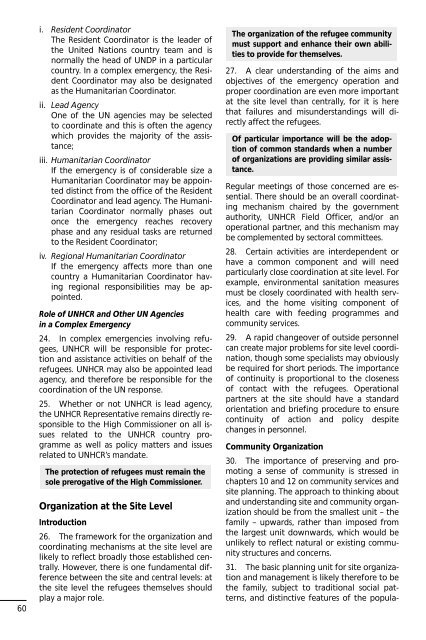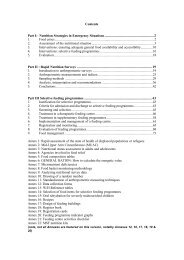UNHCR Handbook for Emergencies - UNHCR eCentre
UNHCR Handbook for Emergencies - UNHCR eCentre
UNHCR Handbook for Emergencies - UNHCR eCentre
Create successful ePaper yourself
Turn your PDF publications into a flip-book with our unique Google optimized e-Paper software.
60<br />
i. Resident Coordinator<br />
The Resident Coordinator is the leader of<br />
the United Nations country team and is<br />
normally the head of UNDP in a particular<br />
country. In a complex emergency, the Resident<br />
Coordinator may also be designated<br />
as the Humanitarian Coordinator.<br />
ii. Lead Agency<br />
One of the UN agencies may be selected<br />
to coordinate and this is often the agency<br />
which provides the majority of the assistance;<br />
iii. Humanitarian Coordinator<br />
If the emergency is of considerable size a<br />
Humanitarian Coordinator may be appointed<br />
distinct from the office of the Resident<br />
Coordinator and lead agency. The Humanitarian<br />
Coordinator normally phases out<br />
once the emergency reaches recovery<br />
phase and any residual tasks are returned<br />
to the Resident Coordinator;<br />
iv. Regional Humanitarian Coordinator<br />
If the emergency affects more than one<br />
country a Humanitarian Coordinator having<br />
regional responsibilities may be appointed.<br />
Role of <strong>UNHCR</strong> and Other UN Agencies<br />
in a Complex Emergency<br />
24. In complex emergencies involving refugees,<br />
<strong>UNHCR</strong> will be responsible <strong>for</strong> protection<br />
and assistance activities on behalf of the<br />
refugees. <strong>UNHCR</strong> may also be appointed lead<br />
agency, and there<strong>for</strong>e be responsible <strong>for</strong> the<br />
coordination of the UN response.<br />
25. Whether or not <strong>UNHCR</strong> is lead agency,<br />
the <strong>UNHCR</strong> Representative remains directly responsible<br />
to the High Commissioner on all issues<br />
related to the <strong>UNHCR</strong> country programme<br />
as well as policy matters and issues<br />
related to <strong>UNHCR</strong>’s mandate.<br />
The protection of refugees must remain the<br />
sole prerogative of the High Commissioner.<br />
Organization at the Site Level<br />
Introduction<br />
26. The framework <strong>for</strong> the organization and<br />
coordinating mechanisms at the site level are<br />
likely to reflect broadly those established centrally.<br />
However, there is one fundamental difference<br />
between the site and central levels: at<br />
the site level the refugees themselves should<br />
play a major role.<br />
The organization of the refugee community<br />
must support and enhance their own abilities<br />
to provide <strong>for</strong> themselves.<br />
27. A clear understanding of the aims and<br />
objectives of the emergency operation and<br />
proper coordination are even more important<br />
at the site level than centrally, <strong>for</strong> it is here<br />
that failures and misunderstandings will directly<br />
affect the refugees.<br />
Of particular importance will be the adoption<br />
of common standards when a number<br />
of organizations are providing similar assistance.<br />
Regular meetings of those concerned are essential.<br />
There should be an overall coordinating<br />
mechanism chaired by the government<br />
authority, <strong>UNHCR</strong> Field Officer, and/or an<br />
operational partner, and this mechanism may<br />
be complemented by sectoral committees.<br />
28. Certain activities are interdependent or<br />
have a common component and will need<br />
particularly close coordination at site level. For<br />
example, environmental sanitation measures<br />
must be closely coordinated with health services,<br />
and the home visiting component of<br />
health care with feeding programmes and<br />
community services.<br />
29. A rapid changeover of outside personnel<br />
can create major problems <strong>for</strong> site level coordination,<br />
though some specialists may obviously<br />
be required <strong>for</strong> short periods. The importance<br />
of continuity is proportional to the closeness<br />
of contact with the refugees. Operational<br />
partners at the site should have a standard<br />
orientation and briefing procedure to ensure<br />
continuity of action and policy despite<br />
changes in personnel.<br />
Community Organization<br />
30. The importance of preserving and promoting<br />
a sense of community is stressed in<br />
chapters 10 and 12 on community services and<br />
site planning. The approach to thinking about<br />
and understanding site and community organization<br />
should be from the smallest unit – the<br />
family – upwards, rather than imposed from<br />
the largest unit downwards, which would be<br />
unlikely to reflect natural or existing community<br />
structures and concerns.<br />
31. The basic planning unit <strong>for</strong> site organization<br />
and management is likely there<strong>for</strong>e to be<br />
the family, subject to traditional social patterns,<br />
and distinctive features of the popula-



